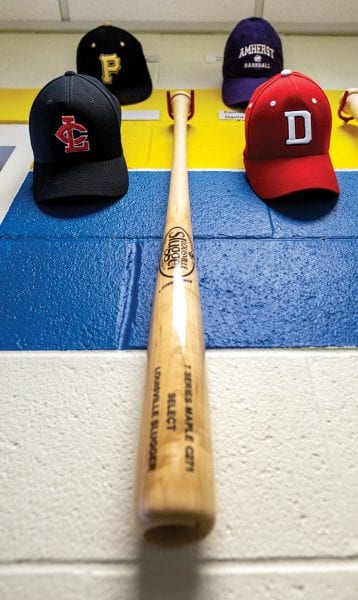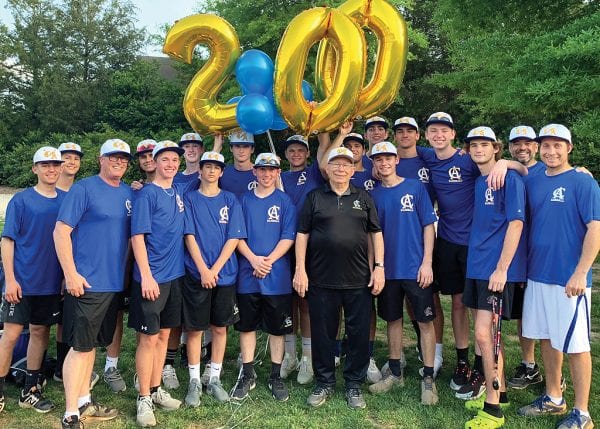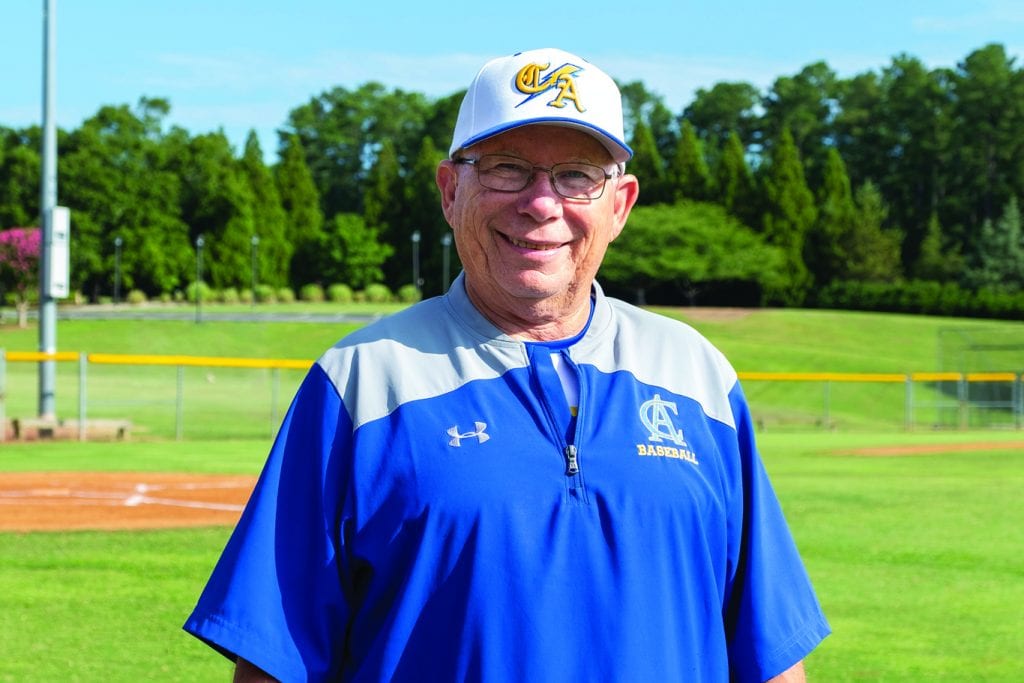Sixteen years ago, Assistant Athletic Director Ray Pope never saw a place for himself in the classroom. In the summer of 2003, his phone was ringing off the hook; Cary Academy called daily, in search of a new baseball coach. His answer every single time: “I’m not interested.”
Coach Pope—who teaches physical education and surpassed 200 wins as CA’s varsity baseball coach this past May—recalls, “I had no plans to be a high school coach; never in my wildest dreams did I think this was in my future.”
To this point in life, Pope had been many things: a baseball player for the Army, senior management at McDonald’s, scout for the Atlanta Braves, private baseball coach, husband, and father, but there was one thing he was certain he had never been. “I’d never been a teacher; it didn’t seem like something I could do.”
Cary Academy wouldn’t take “no” for an answer. Pope had earned a stellar reputation with CA administrators and several parents through his work as a coach with Grand Slam sports, where he worked with aspiring baseball players to elevate their skills and their outlook through private lessons.
Convinced to come in for a meeting, a conversation with then-Athletic Co-Director Kim Cherre gave him a new frame of reference. “I came away realizing that, as a coach, I was always teaching. If I could be a teacher out on the field, I could do it in a classroom.”
Cary Academy finally got their “yes.”
CHANGING MINDSETS
During his first year at Cary Academy, Pope’s varsity baseball team won just four games, but it wasn’t the number of losses that concerned him; it was his players’ mindset.
“I heard kids in the dugout, before the first game, wondering how badly they were going to lose that day. No matter what, I knew the first thing that needed to change was the culture. We hadn’t even played a game yet and they were talking about losing. Don’t get me wrong: I like winning, but only if we win the right way.”
One of Pope’s first changes to CA’s program was to implement year-round baseball workouts. They allowed him to build deeper connections with his players that extended beyond the short season. He focused on rewarding students’ work ethic, determination, dedication, and outlook, in addition to improving their athletic skills.
It did not take long for Pope’s efforts to have an impact. The Chargers won a conference championship during just his second season as head coach.
“My coaching philosophy is about planting seeds and empowering people—not just on the athletic field—but in the classroom, and their broader lives. I try to take the students we have and help make them better.”
Pope is a big believer in the power of athletics to transform, to convey big life lessons. “Since I was nine or ten, sports have been a stabilizing force in my life. When I’m stressed out, I fall back on the lessons I’ve learned from them.” He credits athletics with providing him a moral compass throughout his own life. His baseball career has taught him to listen to those he leads; to appreciate those who support him—most notably for Pope, his wife of more than 40 years, Judy Pope; and to recognize the importance of “taking care of business” in life beyond the playing field.

It is exactly these kind of personal lessons and experiences that Pope hopes to impart to his students and players. He makes sure they know his guidance comes from a place of affection, a desire to make sure that their time in Upper School will be “four years they can be proud of.”
“Coach Pope was a great role model,” offers Justin Reich (’16), who played for Pope for four years. “He helped us grow as players and people, preaching that it’s the ‘little things’—things like character, dedication, and attention to detail—that win games, that matter beyond baseball.”
While Pope, who describes himself as an “old school coach,” knows how to light a fire under his students, he also knows how to support and enable them to reach the next level. “My kids know I love them. They know I care about their success, both on the field and in the classroom.”
“On senior day, Coach asks each graduating player for a hat from their college,” explains Reich. “Those hats line the walls of his office, alongside trophies, bats, and team pictures. It shows just how invested he is in his players’ lives and how proud he is of CA baseball.”
Pope acknowledges that the nature of athletics means that he might be leading his players and students into situations where they must learn to cope with challenges, adversity, and even disappointments that can cause friction in the moment. “Sometimes they make mistakes and that can lead to serious talks,” he offers.
As a result, he notes that he might not always be the favorite teacher when it comes time for students to graduate. He’s come to learn, however, that lessons not always appreciated in the moment have a way of becoming understood and respected over time: “One way I measure success is how many weddings I get invited to,” he quips.
Let’s just say he’s been to more than a few.
LEADING BY EXAMPLE
Four years ago, Pope was asked by Athletic Director Kevin Jones to attend a workshop by Jeff Janssen, a world-wide leader in athletic leadership. It would prove to be a pivotal experience.
Inspired by the workshop, Pope proposed an after-school Athletic Leadership Academy for Cary Academy students, athletes, faculty, and staff. Over the academic year, participants would meet to learn how to better listen, respect, energize, and empower their peers. And, any student interested in captaining a team would be required to participate.
Now entering its fourth year, the program—led by Pope and his son Brandon, a fellow coach and CA physical education teacher—mentors 75 students annually. Half of the students are “emerging” leaders attending for the first time; the other half are veterans who, having learned the skills during a previous Leadership Academy, are tasked with applying those lessons to the real world. Emerging and veteran leaders alike meet six times over the year to role-play scenarios and discuss the finer points of identifying the needs of their peers and teammates.
Pope runs a tight ship. He locks the doors promptly when class begins and tolerates no unexcused absences. But don’t mistake accountability for inflexibility.
Like other courses at CA, students in the Leadership Academy have a role to play in shaping their learning. Every year, the program has evolved, with changes directed by student input. The length of individual classes, the pedagogical format, the topics of focus, the timing after school, and even the food served, have all been reworked, at some point, to address student needs or feedback.
Listening to the needs of his students is a key tenet of Pope’s leadership philosophy, which he hopes to impart to his students, whether or not they seek a leadership role. “Not everyone wants to be a leader, but they can learn the skills and use them throughout their lives, in school, work, and home.”
GET UP AND DO IT AGAIN TOMORROW
As is typical of his humble leadership style, Pope didn’t call attention to surpassing 200 wins. He wasn’t even aware of the milestone until Head of School Mike Ehrhardt stopped by his office to offer congratulations.
True to form, his focus was already on to the next challenge. To Pope, it was just another win by his players and certainly one he wouldn’t take the credit for alone: “200 wins? One person can’t do that—it takes a coalition of administration, coaching staff, faculty, parents, and players to make that happen.”
Pope calls his current role at CA a “dream job”—both for allowing him to work alongside his son, Brandon, and for the life-changing chance to teach.
“Teaching is a two-way street. I learn more from the kids than they do from me, sometimes. And, there is always more to know, whether it’s about life, school, or baseball; if you stop learning, then you’re doing something wrong.”
Pope’s passion for teaching extends beyond his formal roles in the baseball dugout and Fitness Center. He regularly mentors other CA coaches and aids in the Middle School student experience by providing lessons on sportsmanship, self-confidence, teamwork, and work ethic, all of which he models in his day-to-day campus life.
 On most days, Pope is the first to arrive on campus and one of the last to leave. “At the end of each day, I want to be able to ask myself, ‘Did I do the best job I could today?’ And then I get up and do it, again, tomorrow.”
On most days, Pope is the first to arrive on campus and one of the last to leave. “At the end of each day, I want to be able to ask myself, ‘Did I do the best job I could today?’ And then I get up and do it, again, tomorrow.”
At the heart of his work ethic? A love of baseball: “I love it mostly for the life lessons it teaches: leadership, respect, how to handle failure, how to work together as a team, how to care about your teammates, how to celebrate a teammate’s success, how to put the needs of the team ahead of your own. It takes a lot of skill to play the game. Trying to hit a round ball with a round bat? Not everybody can do that. Oh, did I mention how fun it is? Not a better game.”


